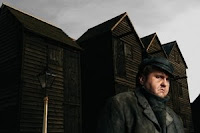
After nearly three weeks, the
Metropolitan Opera finally managed to get Ben Heppner and Deborah Voigt on stage at the same time.
This "dream team," which pairs two of today's leading Wagnerians, was scheduled to appear in six performances of
Tristan und Isolde, but a
well-documented series of illnesses left that plan in shambles. For those who shelled out the big bucks on any the first five nights, they were rewarded with at least one substitute; for those who shelled out the big bucks on Friday night (like me!!), they were rewarded with a gripping performance of historic importance.
Heppner, as the doomed Tristan, returned from a serious blood infection to deliver an astonishing tour de force. He is a heldentenor in the truest sense--a physically imposing singer with a commanding voice that slices through even the loudest orchestra with incredible ease. Many tenors begin to crumble during the punishing Act III monologue, but Heppner seemed to relish it, singing with delirious, shattering intensity. Moreover, he attacked each note with complete integrity and security; pure intonation was never in doubt, even in the most angular, exposed high notes. Remarkably, Heppner was just as strong–perhaps stronger–on Tristan's final note as he was, five hours earlier, on his first.
It took me an act to warm up to
Voigt. She has two habits that initially bothered me: drifting flat at the end of long phrases and sliding up into high notes. Beginning in Act II, however, she was mesmerizing. Her sweet, lyrical voice, which was balanced with soaring, dynamic power, quickly erased all my reservations, particularly in the haunting love duet. As she and Heppner sat in darkness, silhouetted against a glowing blue background, motion simply stopped, creating a blissful, erotic trance. Unfortunately, yet understandably, her final note in the
Liebestod, a make-or-break moment in the opera for some listeners, fell a bit short of the mark. But it didn't even remotely ditract from a tremendous vocal achievement.
Without exception, the rest of the cast, including
Michelle DeYoung as Brangäne and
Eike Wilm Schulte as Kurwenal, was fabulous, particularly bass Matti Salminen, in what is rumored to be his final Met appearance. His King Marke was heartbreaking, filled with solemn, noble dignity.
James Levine drew another exceptional performance from the Met Orchestra. Some of his tempos were a bit slow for my taste–I wanted a little more visceral energy in moments–but he reveled in the score's tender, psychological pages. Of course, when strength and drama were called, Levine delivered effortlessly.
I've now heard the orchestra under five different batons: Levine (on three occasions) and four guest conductors. With the exception Semyon Bychkov's flat, lifeless
Otello, the orchestra has always played very well. But when Levine is in the pit, there's really no comparison. He unquestionably changes the sound of the orchestra--it's richer, heavier, darker. Without fail, the loudest and most affectionate ovations in a Levine-led performance are for the beloved conductor. And he deserves every second of it.
Unbelievably, before Friday, Heppner and Voigt had never sung
Tristan together, and the sense of occasion was undeniable. In a
review of the performance, Anthony Tommasini, chief critic at
The New York Times and someone with plenty of authority when it comes to opera, evoked the memory of another pair of doomed lovers: Birgit Nilsson and Jon Vickers. That's a bold comparison–Nilsson and Vickers are among history's greatest Wagnerians–but it's not completely unreasonable.
After the first act, I unexpectedly bumped into David Rubin, outgoing dean of the
Newhouse School at Syracuse University and a lifelong opera buff. He has heard all the best singers from the past half century, and I trust his musical judgment without reservation. At one point, he said to me that 50 years from now, people will remember this night as one of the finest collections of singers ever assembled. And after hearing this remarkable performance, how could I disagree?
(Photo by Frank Franklin II/Associated Press)




